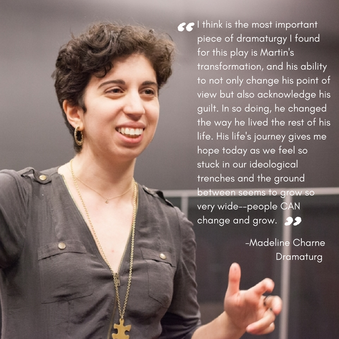|
If you could only share one piece of research or information that you've found in your dramaturgy with an audience, what would that be?  This was a particularly hard play to do dramaturgical research for, though not hard in the conventional sense. There is an abundance of information available about life in the concentration camps during the Holocaust. Many organizations, including the wonderful United States Holocaust Memorial Museum, have made it their mission to compile primary sources and first hand accounts of day to day life during those years. What made it hard was the sheer horror and pain of the truths I was compiling; no matter how many times you read about the progression of events that led to the pogroms, or the experience of suffocating in the gas chambers, it never gets easier to remember that humanity sunk that low. Particularly at this moment in time, when we see xenophobia and hate and fear mixing together once again in a way that seems eerily reminiscent of 1940s Germany, this research is viscerally painful. But what stuck with me the most, and the one piece of research I want to share, is the one that gave me hope. Shannon's play follows the story of Martin Niemoller, a Lutheran Minister who ended up imprisoned during the Holocaust, before writing his now famous poem "First They Came For." Martin's poem is one that we read today as a message to stand up--to fight injustice against others, even if those injustices don't seem to involve you or those like you. Yet, Niemoller is not a simple hero. As Shannon depicts in her play, he spent years before the holocaust preaching a message that only those like himself and his congregation were worthy to be helped, cared for, or saved. He ignored injustices, justified the Nazi's actions, and closed his eyes to the realities of the situations around him. And yet, this man changed. His time in the camps did not just break him down as we might expect, they built in him a respect and understanding for the shared humanity in those he once derided. I found a wonderful article by a man who was one of his bunkmates in Dachau. This bunkmate recalled times that Martin not only stood up for others in the camp, but actually put his own life on the line to protect Jews, disabled people, political prisoners, and many others. What I found most amazing, though, were not just his actions during his time in the concentration camps, but what he chose to do with that new understanding of the world once he was freed. Martin Niemoller cited his 8 years in the concentration camps as a turning point for him and he devoted the rest of his life to changing the attitude of the Church. He was one of the key authors of the Stuttgart Declaration of Guilt, a statement by the Evangelical Church that its leaders acknowledged their own culpability in the Holocaust and admitted that they should have done more to stop it. He also became an ardent pacifist, traveling the world to protest wars far beyond the German borders. He ultimately won the Lenin Peace Prize and spent the end of his life in a chapel he built on the grounds of Dachau, where he endeavored to talk individually to every visitor who entered the grounds about his experiences and the lessons he learned and expressed in his poem. I think is the most important piece of dramaturgy I found for this play is Martin's transformation, and his ability to not only change his point of view but also acknowledge his guilt. In so doing, he changed the way he lived the rest of his life. His life's journey gives me hope today as we feel so stuck in our ideological trenches and the ground between seems to grow so very wide--people CAN change and grow.
-Madeline Charne, Dramaturg for First They Came For
0 Comments
Leave a Reply. |
Categories
All
|
|
This work is licensed under a Creative Commons Attribution-NonCommercial-ShareAlike 2.0 Generic License.
|
|
© Philadelphia Young Playwrights - 1219 Vine Street, Floor 2 Philadelphia, PA 19107
Phone: 215-665-9226 Fax: 215-665-9228 Email: [email protected] |


